Inflation Is Coming, What to Do NOW!
Economics / Inflation Mar 31, 2014 - 06:30 PM GMTBy: Jeff_Clark
 We’ve all heard of the inflationary horrors so many countries have lived through in the past. Third-world countries, developing nations, and advanced economies alike—no country in history has escaped the debilitating fallout of unrepentant currency abuse. And we expect the same fallout to impact the US, the EU, Japan, China—all of today’s countries that have turned to the printing press as a solution to their economic woes.
We’ve all heard of the inflationary horrors so many countries have lived through in the past. Third-world countries, developing nations, and advanced economies alike—no country in history has escaped the debilitating fallout of unrepentant currency abuse. And we expect the same fallout to impact the US, the EU, Japan, China—all of today’s countries that have turned to the printing press as a solution to their economic woes.
Now, it seems obvious to us that the way to protect one’s self against high inflation is to hold one’s wealth in gold… But did citizens in countries that have experienced high or hyperinflation turn to gold in response? Gold enthusiasts may assume so, but what does the data actually show?
Well, Casey Metals Team researcher Alena Mikhan dug up the data. Here’s a country-by-country analysis…
Brazil
Investment demand for gold grew before Brazil’s debt crisis and economic stagnation of the 1980s. However, it really took off in the late ‘80s, when already-high inflation (100-150% annually) picked up steam and hit unsustainable levels in 1989.
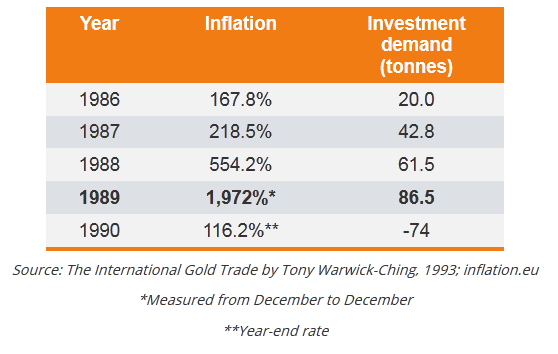
During this period, investment demand for bullion skyrocketed 333%, from 20 tonnes in 1976 to 86.5 tonnes in 1989.
And notice what happened to demand when inflation began to reverse. Substantial liquidations, showing demand’s direct link to inflation.
Indonesia
Indonesia was hit by a severe economic crisis in 1998. The average inflation rate spiked to 58% that year.
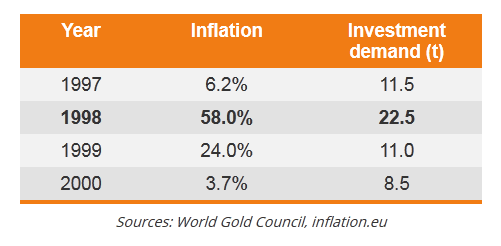
Gold demand doubled as inflation surged. It’s worth pointing out that investment demand in 1997 was already at a record high.
Also, total demand in 1999 reached 120.8 tonnes (not just demand directly attributable to investment), 18% more than in pre-crisis 1997. But overall, once inflation cooled, so again did gold demand.
India
While India has a traditional love of gold, its numbers also demonstrate a direct link between demand and rising inflation. The average inflation rate in 1998 climbed to 13%, and you can see how Indians responded with total consumer demand. (Specifically investment demand data, as distinct from broader consumer demand data, is not available for all countries.)
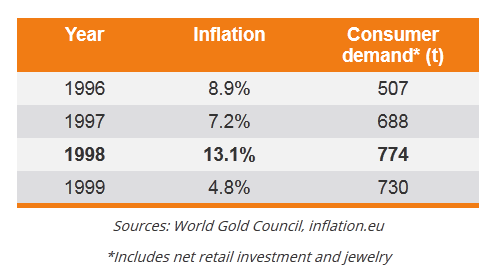
Gold demand hit a record of 774.4 tonnes, 13% above the record set just a year earlier. In fairness, we’ll point out that gold consumption was also growing due to a liberalization of gold import rules at the end of 1997.
When inflation cooled, the same pattern of falling gold demand emerged.
Egypt, Vietnam, United Arab Emirates (UAE)
Here are three countries from the same time frame last decade. Like India, we included jewelry demand since that’s how many consumers in these countries buy their gold.
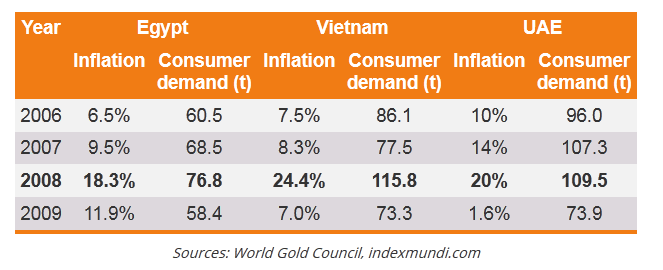
Egypt saw inflation triple from 2006 to 2008, and you can see consumer demand for bullion grew as well. Even more impressive is what the table doesn’t show: Investment demand grew 247% in 1998 over the year before. Overall tonnage was relatively modest, though, from 0.7 to 2.5 tonnes.
Vietnam and the United Arab Emirates saw similar patterns. Gold consumption increased when inflation peaked in 2008. Again, it was investment demand that saw the biggest increases. It grew 71% in Vietnam, and 27% in the United Arab Emirates.
And when inflation subsided? You guessed it: Demand fell.
Japan
Prime Minister Shinzo Abe’s plan to kill deflation pushed Japan’s consumer price inflation index to 1.2% last year—still low, but it had been flat or falling for almost two decades, including 2012.
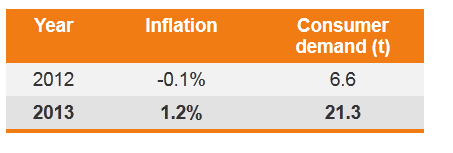
In response, demand for gold coins, bars, and jewelry jumped threefold in the Land of the Rising Sun.
One of the biggest investment sectors that saw increased demand, interestingly, was in pension funds.
Belarus
Unlike many of the nations above, citizens from this country of the former Soviet Union do not have a deep-rooted tradition for gold. However, in 2011, the Belarusian ruble experienced a near threefold depreciation vs. the US dollar. As usual, people bought dollars and euros—but in a new trend, turned to gold as well.
We don’t have access to all the data used in the tables above, but we have firsthand information from people in the country. In the first quarter of 2011, just when it became clear inflation would be severe, gold bar sales increased five times compared to the same period a year earlier. In March alone that year, 471.5 kg of gold (15,158 ounces) were purchased by this small country, which equaled 30% of total gold sales, from just one year earlier. Silver and platinum bullion sales grew noticeably as well.
The “gold rush” didn’t live long, however, as the central bank took measures to curb demand.
Argentina
Argentina’s annual inflation rate topped 26% in March last year, which, according to Bloomberg, made residents “desperate for gold.” Specific data is hard to come by because only one bank in the country trades gold, but everything we read had the same conclusion: Argentines bought more gold last year than ever before.
At one point, one bank, Banco Ciudad, even tried to buy gold directly from mining companies because it couldn’t keep up with demand. Some analysts report that demand has continued this year but that it has shown up in gold stocks.
What to Do—NOW
History clearly shows there is a direct link between inflation and gold demand. When inflation jumps, or even when inflation expectations rise, investors turn to gold in greater numbers. And when gold demand rises, so does its price—you can guess what happens to gold stocks.
With the amount of money the developed countries continue to print, high to hyperinflation is virtually inevitable. We cannot afford to believe in free lunches.
The conclusion is inescapable: One must buy gold (and silver) now, before the masses rush in. The upcoming inflationary storm will encompass most of the globe, so the amount of demand could push prices far higher than many think—and further, make bullion scarce.
Your neighbors will soon be buying. We suggest beating them to the punch.
Remember, gold speaks every language, is highly liquid anywhere in the world, and is a proven store of wealth over thousands of years.
But what to buy? Where? How?
We can help. With a subscription to our monthly newsletter, BIG GOLD, you’ll get the Bullion Buyers Guide, which lists the most trustworthy dealers, thoroughly vetted by the Metals team, as well as the top medium- and large-cap gold and silver producers, royalty companies, and funds.
Normally I’d suggest that you try BIG GOLD risk-free for 3 months, but right now, I can offer you something even better: ALL EIGHT of Casey’s monthly newsletters for one low price, at a huge 55% discount.
It’s called the Casey OnePass and lets you profit from the huge variety of investment opportunities we here at Casey Research are seeing in our respective sectors right now—from precious metals to energy, technology, big-picture trend investing, and income investing.
Click here to find out more. But hurry—the Casey OnePass offer expires this Friday, April 4.
Disclaimer: The above is a matter of opinion provided for general information purposes only and is not intended as investment advice. Information and analysis above are derived from sources and utilising methods believed to be reliable, but we cannot accept responsibility for any losses you may incur as a result of this analysis. Individuals should consult with their personal financial advisors.
Casey Research Archive |
© 2005-2022 http://www.MarketOracle.co.uk - The Market Oracle is a FREE Daily Financial Markets Analysis & Forecasting online publication.



